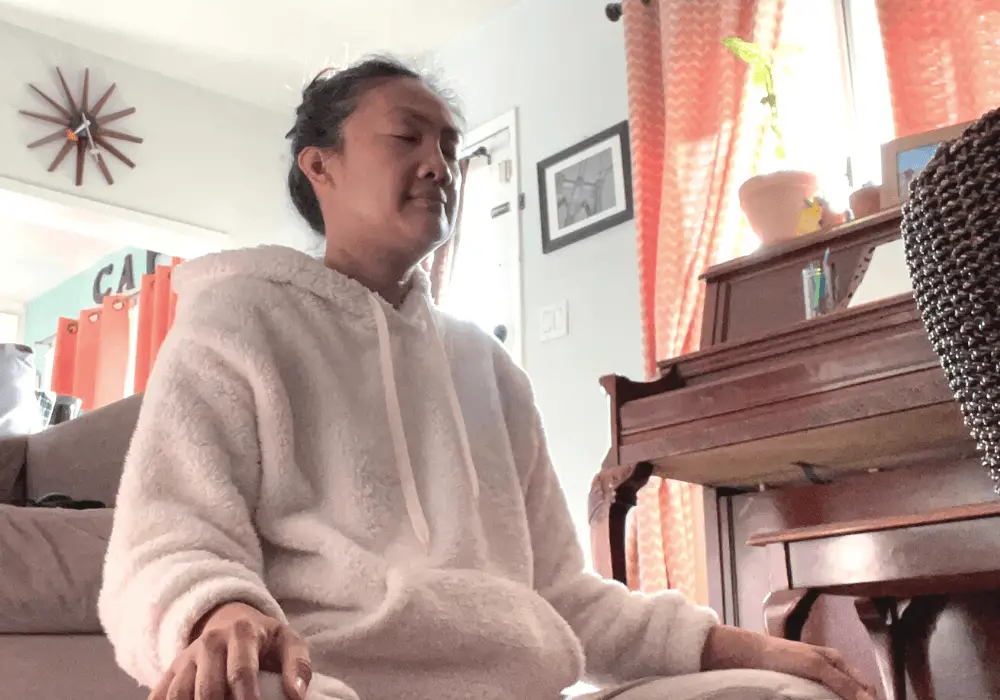People who have a lack of self-awareness usually have a hard time expressing themselves and articulating how they feel.
They may lack awareness of:
- their thoughts, feelings, and behaviors
- their connection to their experiences
- the consequences of their behavior
- how their actions affect those around them
- and how their lives are interconnected with others.
I know from personal experience that it can be challenging to connect with yourself and see who you truly are.
It was challenging sometimes to truly connect with others because I wasn’t connected to myself.
This is why I’ll go over what it means to lack self-awareness, how to spot the signs, how it affects your life, why it’s important to be self-aware, and tips on how to increase your self-awareness.
What it means to lack self-awareness.
According to a study, self-awareness is
“Conscious awareness of one’s internal states and interactions with others.”
This means that if you lack self-awareness, you have trouble understanding & recognizing your own thoughts, emotions, & behaviors and how they affect your relationships with others.
This lack of awareness can be internal or external.
Lack of internal awareness.
If you lack internal awareness, you’re unaware of such things as your
- strengths & weaknesses
- likes & dislikes
- personal values
- and personal core beliefs.
You have trouble identifying and labeling your emotions accurately, which can influence your behavior and thought patterns.
This lack of internal awareness can make it difficult to recognize inner problems and change them.
Lack of external awareness.
When you lack external awareness, you have difficulty understanding how other people perceive you.
You can’t see yourself through the eyes of others, which can affect your relationship with the people you interact with.
For most of my life, I didn’t have the skills to be self-aware both internally and externally. That is until I had an epiphany one day during a heated conversation with someone.
I was trying to get this person to see things my way and I was suddenly aware of this fact while we were talking.
I recognized in that instant that I was never going to change the other person’s mind, no matter how hard I tried.
If I continued to argue, I would only make the situation worse. Not only that, I would probably be so upset that any possibility of reasoning would be thrown out the window.
Overall, a lack of self-awareness can affect your relationship with yourself and others, which is why it’s important to know the signs that you lack self-awareness.
10 Signs you lack self-awareness.
As someone who has struggled with self-awareness in the past, I know firsthand how difficult it can be to recognize when you lack it.
Here are 10 key signs to look out for:
1. Difficulty Articulating Your Feelings
If you have a hard time articulating what you feel, it could be a sign of lacking self-awareness.
When you’re not self-aware, you might struggle to identify and understand your emotions, making it challenging to communicate them to others.
This could lead to a lack of intimacy and connection in your relationships.
2. Trouble Expressing Yourself
If you have trouble expressing yourself, this could be another sign that you’re lacking self-awareness.
You might struggle to communicate effectively with others, which can lead to misunderstandings and frustration.
3. Lacking Empathy
When you lack self-awareness, you may have a hard time empathizing with other people, i.e. understanding their feelings.
This can affect your ability to relate to others emotionally and see a perspective that is different from yours.
4. Negative Behaviors
One of the most significant signs of lacking self-awareness is a failure to pick up on negative behavior patterns.
For example, you might find yourself constantly repeating behavior patterns such as interrupting others, making insensitive comments, or failing to take responsibility for your actions.
Negative behavior patterns can be harmful not just to yourself but to other people.
5. Arrogance
Arrogance may be another sign of lacking self-awareness. When you’re not self-aware, you might overestimate your abilities or accomplishments and underestimate the contributions of others.
You might also be dismissive of feedback or suggestions from others, believing that you know best.
6. Overreacting
Lacking self-awareness can also cause you to overreact to situations that don’t warrant it.
For example, you might become defensive or angry in response to constructive criticism or take minor setbacks as personal failures.
Overreacting can lead to unnecessary conflict and damage relationships.
7. Denial
When you’re not self-aware, you might be in denial of your mistakes and shortcomings.
You blame others for them and refuse to take responsibility for your own actions.
This can prevent you from learning from your experiences and growing as a person.
8. Winning At All Costs
When you’re not self-aware, you might prioritize winning over everything else.
This can negatively impact your well-being as well as the happiness & welfare of other people.
9. People pleasing.
Lacking self-awareness can manifest as people pleasing. When you don’t have a strong sense of who you are, you will try to get validation and approval from others.
You bend over backward trying to make everyone like you at the expense of your personal well-being.
10. Narcissism
Narcissists have an inflated sense of self-importance and are obsessed with their own achievements, talents, and appearance.
Narcissists also tend to exaggerate their abilities and accomplishments, and they are highly sensitive to criticism and rejection.
Because of these traits, they can be unaware of how their behavior affects others’ feelings and needs.
Other examples of lacking self-awareness
The following examples are other ways that a lack of self-awareness can manifest.
They may be things that you have no control over but should be aware of because they can affect you personally and socially.
ADD/ADHD
Those with ADD/ADHD may be unaware of how their traits & behavior affect their relationship with others.
People with Attention Deficit Disorder (ADD) or Attention Deficit Hyperactivity Disorder (ADHD) have difficulty with attention, focus, and impulse control.
They may be easily distracted, forgetful, and disorganized. They may also have a tendency to interrupt and speak over others.
Autism
People with autism might not be aware of their own feelings and emotions, making it difficult to express them to others.
They might also have trouble understanding social cues and struggle to relate to other people.
This can lead to difficulty with social interaction, communication, and socially acceptable behaviors.
Overall, a lack of self-awareness can have a significant impact on one’s life and there are reasons why this happens.
Why we lack self-awareness.
We might lack self-awareness because we were not taught self-awareness or we didn’t learn how to be self-aware.
I was well into my adult years before I started practicing self-awareness because I simply didn’t know how to do it and was never taught how to be self-aware.
Here are other reasons why we lack self-awareness:
1. Being Too Busy
Whether we realize it or not, busyness can lead to a lack of self-awareness.
As we go about our daily life, we are often so busy that we don’t have time to reflect on our lives, let alone our thoughts, feelings, and actions.
We are constantly running from one task to the next, and don’t give ourselves a chance to slow down and think about what we’re doing and why we’re doing it.
2. Feeling Afraid
Sometimes, we are too afraid to examine our personal lives because it can be uncomfortable and unpleasant.
Being more self-aware would mean confronting our own flaws and weaknesses. It would also mean looking more deeply at any negative thought or behavioral patterns.
So instead we avoid pain by remaining unaware of our whole, true selves.
3. Differences Of Cultures
Growing up, I was not taught how to be self-aware because of the 2 different cultures I grew up in.
One of the differences in one of the cultures I grew up in was how children are raised. Children in this culture were generally seen and not heard.
I was not encouraged to reflect on my thoughts, feelings, and actions, so I never developed the habit of doing so.
This isn’t to say that one is bad and the other is good but rather to shed light on how cultural differences can affect self-awareness.
By recognizing what causes a lack of self-awareness, we can begin to observe how it affects our lives.
What are the effects of a lack of self-awareness?
Lacking self-awareness can have a significant impact on your life. Here’s what I experienced and what you may experience from a lack of self-awareness:
I. Difficulty seeing other points of view
When I lacked self-awareness, I found it difficult to visualize other points of view.
I would get defensive when someone disagreed with me and take it personally when someone criticized me.
Reactions such as these can be rooted in a weak sense of self-awareness.
II. Struggle to overcome setbacks
When I didn’t understand my own strengths and weaknesses, I was more likely to take failures and setbacks personally.
I struggled to move on from them because to me, making mistakes was a sign of weakness and I wanted to be seen as perfect.
This can make it difficult to take risks, try new things, and grow as a person.
III. Lack of personal growth
My lack of self-awareness made it harder to grow mentally, emotionally, and socially because I would get stuck in negative thought patterns & behaviors.
I didn’t realize that I was holding myself back with my own limiting beliefs and self-talk.
Having a lack of self-awareness can keep you from growing and moving forward in life.
IV. Relationship issues
I used to struggle to form strong relationships with others because of my lack of self-awareness.
For example, sometimes I couldn’t relate to my coworkers when they would share personal stories with me and other employees.
I would often compare myself to them and judge myself because I wasn’t more like them.
They seemed to have more interesting stories, more maturity, and more life experiences even though some were younger than me.
What I wasn’t aware of then was that I did have something to share.
I had a unique perspective on life that was as valuable and important as everyone else’s.
Why it’s important to be self-aware.
It’s important to be self-aware because having awareness of yourself can affect your well-being.
According to a study, having more self-awareness can create a deeper connection to yourself.
This can create a greater acceptance of yourself and an increase in your overall well-being such as:
- Being more connected to yourself.
- Having more meaning in life.
- Aligning beliefs & values with your actions.
- An increasing sense of self-significance.
- Choosing goals based on personal interests.
- Increased levels of happiness.
- Increased compassion for others.
Benefits of being self-aware
Self-awareness has helped me improve my life by better understanding who I am and connecting it to my thoughts, actions, and relationships with others.
Here are some of the benefits you might experience as a result of being more self-aware.
A. Improved decision-making
When you are self-aware, you have a better understanding of your strengths and weaknesses.
This knowledge can help you make better decisions in your personal and professional life.
For example, if you know that you struggle with time management, you can make a conscious effort to prioritize your tasks and manage your time more effectively.
B. Better relationships
Self-awareness can improve your life by creating more meaningful and fulfilling relationships.
When you understand your own emotions and behaviors, you are better equipped to understand and empathize with others.
C. Increased self-confidence
Having greater awareness of yourself can lead to a boost in self-confidence and an increase in self-esteem.
When you are more confident in yourself, you are more likely to take risks and pursue your goals because you have a clear understanding of your values, beliefs, and what you stand for.
D. Improved communication
Self-awareness can also improve your communication skills. When you understand your own thoughts, emotions, and behaviors, you are better able to express yourself to others.
You are also better equipped to listen to others and understand their perspectives.
E. Better stress management
When you are self-aware, you are better equipped to manage stress, which can lead to improved physical and mental health.
You are more likely to recognize when you are feeling burnt out or overwhelmed and take steps to manage those feelings.
Self-awareness can help you improve your life internally & externally and I’m going to share some of my favorite ways to become more self-aware.
How to be more self-aware
Improving self-awareness can be a challenging task, but it’s essential for personal growth and development. Here are some of my favorite tools to be more self-aware.
1. Journaling
Journaling is not only insightful, it can help you process your thoughts so you understand yourself better and become more self-aware.
Journaling can also help you:
- gain clarity and insight
- understand your thought & behavior patterns
- reflect on your everyday experiences
- track your progress
- and set goals for the future.
My favorite way to journal is without prompts. I write one full page each morning without filtering or judging myself.
You will need to set aside a few minutes each day to write in a paper journal or an app on your phone or computer.
Try to be honest and open with yourself, and don’t worry about grammar, spelling, or if you’re doing it perfectly.
Another way to journal is to use prompts, which are usually questions or exercises that you answer.
If you’re interested in journal prompts, I have a guide that you can download and print down below to help you become more aware of yourself.
2. Mindfulness
Mindfulness is a great way to increase your self-awareness and help reduce stress & anxiety.
Though there are many different ways to practice mindfulness, I’ll share 2 simple techniques to get you started.
The first is to find a quiet place to sit or lay down. Then set a timer for a specified period, relax, and close your eyes.
Try to take deep breaths and notice the sights, sounds, and sensations inside and around you. Then let go of any distractions as you become aware of them.
Do this until your timer goes off.
The second way to practice mindfulness is to be mindful as you go about your day.

You can do any type of activity, like sipping your coffee, and call it mindfulness as long as you’re doing one thing at a time and you’re engaged in the present moment.
It’s as effective as sitting still in a quiet place and you can seamlessly blend it into your daily activities.
3. Meditation
Meditation is another powerful tool for improving self-awareness.
The goal of meditation is not to clear your mind of thoughts but to train it to be present and not become attached to your thoughts, feelings, sensations, and reactions.
To start meditating, find a quiet place where you won’t be disturbed. Sit comfortably with your back straight and your eyes closed.

Focus on your breath and be present with whatever comes into your awareness. If your mind wanders, gently bring your attention back to your breath.
Repeat this over and over until your timer goes off.
4. Physical activity
Physical activity can also be a means of promoting self-connection, which can help raise self-awareness.
Being active might help you:
- tune into your sensations and feelings
- enhance self-connection
- building self-confidence
- promote independence
- promote positive body image
- accept internal values & goals
- increase self-acceptance
5. Honest Feedback
Getting honest feedback can be a valuable tool for improving self-awareness because other people might know you better than you know yourself.
You can start by asking your friends, family, or colleagues for feedback on your behavior and communication style.
Be specific with your questions. Here are a couple of examples:
- “How do I come across when I speak to you?”
- “What could I do to improve how I communicate with you?”
When you’re getting feedback, be open to constructive criticism and use it as an opportunity to raise your self-awareness.
As you continue these daily practices, you will recognize the signs that indicate you’ve improved your self-awareness and other areas of your life.
Signs that you’re more self-aware.
As I continue my own daily practices to be more self-aware, I noticed that my life has improved.
Here are some signs that you’re becoming more self-aware and you’re headed in the right direction.
I. You can express yourself more clearly
One of the signs of being more self-aware is you’re able to express yourself more clearly because you’re aware of your feelings and where they’re coming from.
This means that you’re more likely to communicate your needs and wants effectively and less likely to get into conflicts with others.
II. You don’t have to please others
When you’re self-aware, you’re more connected to yourself and accept yourself for who you are.
You don’t have to please others in order to feel good about yourself. You’re able to make decisions based on your own values and needs, rather than trying to gain approval from others.
This means that you’re more likely to live an authentic life and be true to yourself.
III. You are more empathetic
Another sign of self-awareness is an increase in empathy towards others. By being more self-aware, you’re able to see yourself in others.
You see their humanity and understand where they’re coming from. You’re able to put yourself in other people’s shoes and understand their perspective.
IV. You have better boundaries
When you are more self-aware, you’re able to recognize when someone is crossing the line and can set boundaries to protect yourself.
This means that you’re less likely to be taken advantage of and more likely to have mutual respect in your relationships.
V. You can reframe your mind when you get upset
When you’re self-aware, you’re able to reframe your mind when you get upset. This doesn’t mean that you ignore your own feelings.
It means that instead of getting stuck in negative thought patterns, you’re able to step back and look at the situation objectively and find solutions to problems.
VI. You have more compassion toward yourself and others
Self-awareness also means that you have more compassion toward yourself and others.
You’re able to recognize your own imperfections and see them as being perfectly human.
This means that:
- You also see your mistakes as learning opportunities rather than character flaws
- You’re less likely to engage in negative self-talk
- And you’re more likely to practice self-care.
If you’re still struggling or things become overwhelming, you can always get help.
Seeking Help or Treatment for Lack of Self-Awareness
Asking for help or seeking treatment for anything is never a sign of weakness.
Getting help
You can ask someone you trust like a friend, mentor, or a close relative to help you become more self-aware if you’re struggling.
Therapy
You can also hire a professional like a licensed therapist to help you out if things feel overwhelming.
Therapy can be a valuable tool in improving self-awareness and developing healthy habits and behaviors.
Other ways to increase self-awareness.
Developing self-awareness takes time and effort, but it’s worth it in the end.
If you want to learn more ways to increase your self-awareness, you can embark on a journey of self-discovery with this printable pdf of self-discovery questions.
I also have a complete guide on how to get to know yourself better that goes over what it means, why it’s important, and 100 questions to ask yourself.
Lastly, learning how to be your authentic self is a simple and powerful way to increase your self-awareness because you’re connecting to and expressing your true self openly.
If you have more tips to share, please let me know in the comments!

